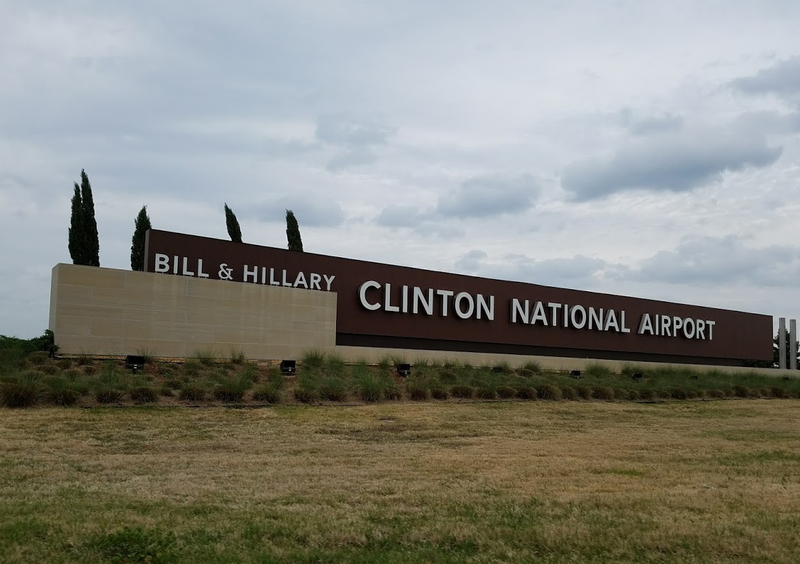Bill and Hillary Clinton National Airport/Adams Field netted nearly $14 million in profit last year, the most money the state's largest airport has ever pocketed from its operations.
Bryan Malinowski, the executive director of the airport, attributed the 7% increase in net income compared with 2018 in part to higher passenger traffic and modest increases in charges to airlines, such as landing fees.
The increase was the highest since revenue from operations before depreciation grew 28.5% between 2015 and 2016, going from $9.8 million to $12.5 million, according to David Tipton, the airport's finance director.
"These are really good numbers," Malinowski told members of the Little Rock Municipal Airport Commission's finance committee Tuesday.
The number of airline passengers climbed 4.71% in 2019 to 2,241,716, an increase of 100,825 passengers from the 2,140,891 who went through Clinton National the previous year.
The increased passenger activity helped drive revenue from Clinton National's operations last year to $36,599,491, which was 6% higher than in 2018, when its revenue from operations totaled $34,427,463, according to unaudited numbers that Tipton presented at the meeting.
Operating revenue includes income derived from landing fees, space rentals and other fees charged to the six airlines, which are Allegiant Air, Delta Air Lines, American Airlines, Frontier Airlines, Southwest Airlines and United Airlines.
Operating revenue from airlines totaled $12,710,465, which was 7% higher than what Clinton National collected from the airlines in 2018.
The airport's single largest source of operating revenue is from concessions, which include parking, rental-car operations, restaurants and retail, ground transportation, terminal advertising and vending.
Concession revenue totaled $18.7 million in 2019, which was 4% more than the airport received the previous year.
Parking accounted for most of the total, nearly $10.2 million, or almost $500,000 in additional revenue compared with 2018. Parking rates haven't been increased for several years.
Revenue from restaurants and retail actually fell in 2019, to just barely more than $1 million. The airport's restaurant mix was upended during a renovation of the concourse. A restaurant in the pre-security area also was closed for remodeling. It is to reopen later this week.
Rental-car operations and rental-car customer facility charges totaled more than $7 million, or about $200,000 more than Clinton National collected in 2018.
Ground transportation and vending had nominal increases while terminal advertising was flat.
Another factor in the robust 2019 revenue picture was a 14% jump in income from building leases, largely because of the Federal Emergency Management Agency's decision to lease the airport's Kellett Road facility as a base of operations to deal with the disastrous flooding of the Arkansas River last year.
Clinton National collected $1,873,264 in building-lease income in 2019, or $432,740 more than the $1,440,524 the airport collected the previous year. Almost all of the difference, $399,000, was income generated by the FEMA lease, according to Tipton.
The federal agency remains in the building on a month-to-month basis, according to Tom Clarke, the airport's properties, planning and development director.
Expenses in 2019, meanwhile, totaled $22,683,822, which was 6% more than in 2018.
The biggest expense was salaries, wages and benefits for the airport's roughly 150 employees, which amounted to $11,791,195, or $607,636 more than the year before.
Salaries and wages accounted for $7,833,684, or $317,994 more than in 2018. Benefits totaled $3,957,511, which was $289,642 more than the previous year.
Professional and contracted services rose 6%, to $6,333,472. The increase was mostly attributable to additional Little Rock police officers assigned to the airport, according to Tipton. The airport pays the salaries of the officers who work at the airport.
Police and security cost Clinton National $2,248,582 in 2019, or $240,305 more than the previous year.
Other operation expenses totaled $3,672,742, a 7% increase. Utility costs accounted for the increase, $230,314, in part because of FEMA's use of the Kellett Road facility.
Deducting the operating expenses from revenue left Clinton National with $13,915,669, which was almost $1 million more than the $12,947,589 the airport realized in 2018.
The airport ended the year with cash and cash equivalents totaling $63,392,029, compared with $52,737,702 at the end of 2018.
Clinton National has been growing its cash pile in anticipation of future projects, including adding gates to the concourse.
The airport also had nonoperating revenue totaling $12,252,446 last year, which was almost $1 million less than the $13,212,550 the airport recorded in 2018.
Nonoperating revenue includes passenger facility charges, which grew $207,325, to $4,347,891. Passenger facility charges are a federally mandated fee of $4.50 that the airport collects on each boarding passenger.
That money can be used to pay for projects approved by the Federal Aviation Administration that enhance the safety, security or capacity of the airport as well as reduce noise or increase airline competition.
Other nonoperating revenue included interest income ($1.5 million) and federal, state and local grants ($5.6 million).
Metro on 01/15/2020

